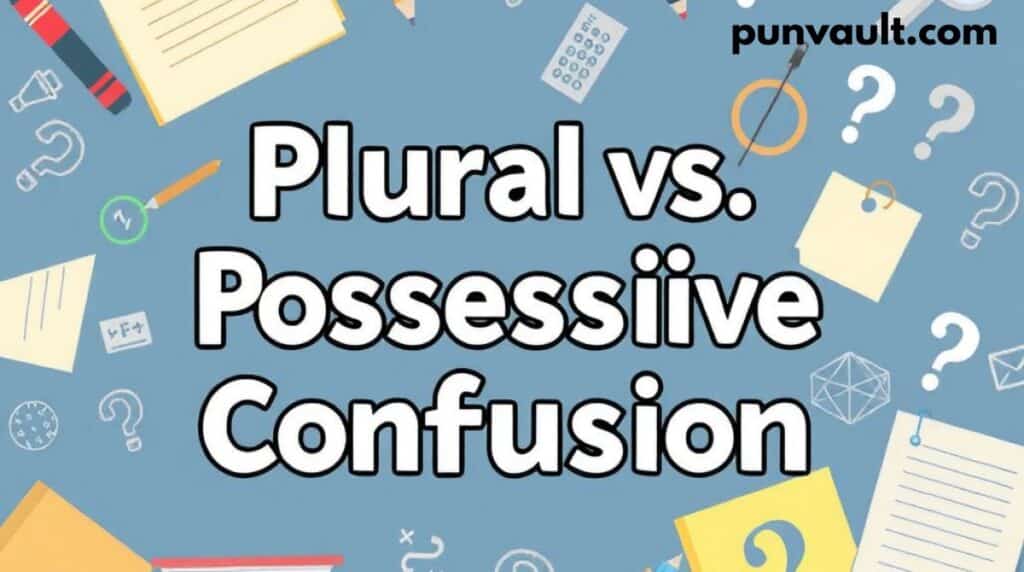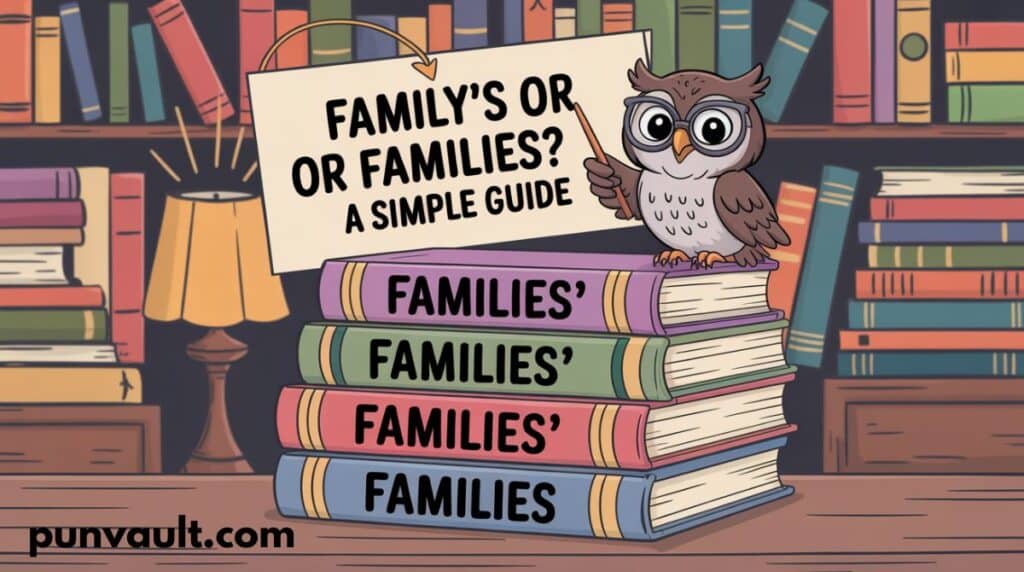“Family’s or Families’ or Families? A Simple Guide” refers to a straightforward explanation distinguishing between three commonly confused forms of the word family. “Family’s” is the singular possessive form, used when something belongs to one family. “Families’” is the plural possessive, referring to something owned by multiple families. “Families” without an apostrophe is simply the plural form of family, referring to more than one group of related people. Understanding these distinctions is essential for clear, grammatically correct writing.
Mastering these subtle differences isn’t just about passing grammar tests—it enhances your confidence and clarity in everyday communication. Whether you’re writing an invitation, crafting a business letter, or creating content, knowing the correct usage can instantly make your writing more polished and professional.
In this simple guide, you’ll discover easy rules, memorable examples, and quick tips to distinguish “Family’s,” “Families’,” and “Families” with ease. By the end, you’ll write with more precision, avoid embarrassing mistakes, and feel empowered every time you type the word family.
Why This Grammar Rule Trips Up Smart People
Even brilliant professionals stumble over possessive forms. Why? Because spoken English doesn’t reveal apostrophe placement, and autocorrect often makes things worse.
Consider this: You hear “the family’s vacation” in conversation. But should you write “the family’s vacation,” “the family’s vacation,” or “the family’s vacation”? Each version means something completely different.
The stakes are higher than you think. Grammatical errors in professional settings can:
- Damage your credibility instantly
- Create costly legal ambiguity
- Confuse readers and waste time
- Make you appear careless or uneducated
The Real-World Impact of Getting This Wrong
Professional Consequences
Email writing mistakes cost careers. A marketing director once sent this to clients: “We value all families’ feedback.” The grammatical error suggested the company only cared about one family’s opinion, not exactly the inclusive message intended.
Contract language becomes legally binding. When a property agreement stated “the family’s house,” lawyers spent months clarifying whether multiple families owned one house or each family owned their own house.
Legal Mishaps
Legal document clarity saves fortunes. A $2.3 million lawsuit arose from a will that read “the family’s inheritance.” Did this mean multiple families would share one inheritance, or each family would receive their own portion?
Apostrophe misuse consequences extend beyond embarrassment. Courts have ruled that punctuation rules affect legal interpretation, making precision essential.
Academic Penalties
Students lose points on assignments for possessive confusion. One graduate student’s thesis was downgraded because of inconsistent usage of family vs. families, which confused the meaning throughout her research.
Social Awkwardness
Holiday cards create annual drama. Writing “The Johnsons” instead of “The Johnsons” on Christmas cards technically means “belonging to the Johnson” rather than “from the Johnson family.”
The Three Forms Decoded (With Memory Tricks)
Family’s (Singular Possessive) – One Family Owns Something
Family’s shows that ONE family possesses something. Think of it as “the family’s” every time.
Crystal-clear examples:
- The Anderson family’s vacation photos filled three albums
- Our family’s traditions include Sunday dinners
- That family’s dog barks every morning at 6 AM
- The family’s car needs new tires
Memory hack: Replace “family’s” with “the family’s” in your head. If it sounds right, you’ve got it. “The family’s vacation photos” works perfectly.
When to use families:
- Describing something one family owns
- Talking about a singular family’s characteristics
- Showing possession by a single family unit
Families (Simple Plural) – Multiple Families, No Ownership

THE family is the plural form with zero ownership involved. You’re simply talking about more than one family.
Rock-solid examples:
- Five families attended the neighborhood barbecue
- These families have lived here for decades
- Military families face unique deployment challenges
- The school serves 200 families in our district
Quick test: Can you replace “families” with “groups of people”? If yes, you need the plural form without an apostrophe.
When to use families:
- Counting multiple family units
- Describing characteristics of multiple families
- Making general statements about family groups
Families’ (Plural Possessive) – Multiple Families Own Something
Families’ is the trickiest—it shows that MULTIPLE families possess something together or separately.
Clear examples:
- The families’ shared garden produces amazing vegetables
- All families’ emergency contacts are filed in the office
- Those families’ children play together every afternoon
- The families’ combined donations funded the playground
Mental shortcut: Think “belonging to families” equals families. The apostrophe comes after the ‘s’ because “families” is already plural.
When to use families’:
- Multiple families own something together
- Each family in a group owns something separately
- Showing possession by more than one family
Side-by-Side Comparison Chart
| Form | Usage | Example | Test |
|---|---|---|---|
| Family’s | One family owns | The family’s house | Replace with “the family’s” |
| Families | Multiple families, no ownership | Three families moved in | Replace with “groups of people” |
| Families’ | Multiple families own | The families’ petition | Think “belonging to families” |
Sentence transformations that demonstrate differences:
- Singular possessive: “The family’s budget covers vacation expenses.”
- Plural: “Several families budget for annual vacations.”
- Plural possessive: “The families’ budgets vary significantly.”
Real-World Scenarios Where This Matters Most
Holiday Greetings That Don’t Backfire
Holiday card message mistakes happen every December. Here’s how to avoid them:
Wrong: “The Smiths wish you happy holidays.” Right: “The Smiths wish you happy holidays.”
Why? You’re talking about the Smith family (plural), not something belonging to the Smiths (possessive).
Template examples you can actually use:
- “The Johnson family sends warm wishes.”
- “Love from the Millers”
- “The Garcia family’s holiday tradition includes…”
READ MORE:165+ Side-Splitting Gallbladder Puns to Tickle Your Funny Organ
Business Communication That Builds Trust
Professional tone requires grammatical precision. Consider these email writing examples:
Marketing newsletter:
- Wrong: “We appreciate all the family’s loyalty.”
- Right: “We appreciate all families’ loyalty.”
Client correspondence:
- Wrong: “Your family’s satisfaction matters.”
- Right: “Your family’s satisfaction matters.”
Company announcement:
- Wrong: “Employee’s families are invited”
- Right: “Employees’ families are invited.”
Legal Documents That Mean What You Think

THE Legal precision prevents costly disputes. Contract language must be crystal clear:
Property agreement:
- Ambiguous: “The family’s property rights”
- Clear: “The families’ property rights” (multiple families own)
- Clear: “The family’s property rights” (one family owns)
Insurance policy:
- Confusing: “All family coverage”
- Clear: “All families’ coverage” (each family has coverage)
Academic Writing That Impresses Professors
Writing correctness in research papers demands consistency:
Research methodology:
- Wrong: “The study examined families’ communication patterns.”
- Right: “The study examined families’ communication patterns.”
Literature review:
- Wrong: “Previous research on families showed…”
- Right: “Previous research on families showed…”
MORE:15 Effective Ways to Turn a Girl On: How to Make a Girl Horny with Confidence and Respect
The 5-Second Decision Tree
Follow this step-by-step flowchart for instant accuracy:
- Are you talking about ONE family?
- Yes → Does that family own something? → Yes = family’s / No = family
- Are you talking about MULTIPLE families?
- Yes → Do those families own something? → Yes = families’ / No = families
Questions to ask yourself:
- Can I replace this with “the family”? Use the family’s
- Can I replace this with “groups of people”? Use families
- Does this mean “belonging to multiple families”? Use families’
Backup strategies when you’re still unsure:
- Rewrite the sentence to avoid the issue
- Use “the family” or “the families” instead
- Ask someone else to read it aloud
Common Traps and How to Avoid Them
The “Smith’s House” Mistake
Family names get mangled constantly. Here’s the truth:
Wrong ways to handle surnames:
- “The Smith’s house” (implies one person named Smith)
- “The Smith house” (sounds like a place name)
Proper ways:
- “The Smiths’ house” (the house belonging to the Smith family)
- “The Smith family’s house” (clearer but wordier)
Regional variations that confuse everyone:
- Some areas say “the Smith house” colloquially
- Formal writing always requires proper possessive forms
- Legal documents must follow standard rules
Plural vs. Possessive Confusion

Sound-alike problems in speech create written communication pitfalls:
Common errors:
- “The family’s vacation” (sounds right, but missing apostrophe)
- “All families are invited” (should be “All families are invited”)
- “Families traditions” (should be “Families’ traditions”)
Technology autocorrect issues:
- Phones often add unwanted apostrophes
- Grammarly sometimes suggests wrong corrections
- Always proofread for clarity manually
Compound Possession Nightmares
When multiple families share ownership:
- “The Brown and Jones families’ shared fence”
- “Both families’ children attend the same school.”
Joint vs. separate possession rules:
- Joint: “The families’ combined garage sale”
- Separate: “Each family’s individual contribution”
Interactive Practice That Actually Sticks
Fill-in-the-blank exercises with immediate feedback:
- Three _____ live on our street. (Answer: families)
- The _____ dog keeps everyone awake. (Answer: family’s)
- All _____ emergency contacts are outdated. (Answer: families)
- Our _____ traditions include game night. (Answer: family’s)
- The _____ petition was signed by everyone. (Answer: families)
Real email scenarios to correct:
- “The Johnson’s are hosting dinner” → “The Johnsons are hosting dinner.”
- “Each family’s contribution helps.” → “Each family’s contribution helps.”
- “We need all family’s addresses” → “We need all families’ addresses.”
Social media post examples:
- “Love seeing all the families at the park!” ✓
- “The families’ support means everything!” ✓
- “Our family’s favorite restaurant closes on Monday.” ✓
Case Study: The $50,000 Contract Error

The Situation
A property management company drafted a lease agreement stating: “The family’s monthly rent includes utilities.” The document was signed by representatives of five families moving into a shared living complex.
The Problem
Ambiguity arose immediately. Did “families’ monthly rent” mean:
- Does each family’s monthly rent include utilities?
- Does all families’ combined monthly rent include utilities?
- Some other interpretation?
The grammatical error created legal chaos. Three families paid individual rent, assuming utilities were included. Two families paid a shared amount, believing they were splitting the total costs.
READ MORE:104+ Heartfelt Ways to Say ‘Thank You for Your Friendship’
The Resolution
Legal fees exceeded $50,000 before resolution. The court ruled that punctuation rules affect contract interpretation. The correct form should have been “each family’s monthly rent” or “all families’ monthly rent.”
Key Takeaways
Apostrophe placement has legal consequences. Contract language must be precise. Error correction costs far more than getting it right initially.
Prevention strategies:
- Always have legal documents reviewed
- Use grammar tools like Grammarly as a first step
- Read contracts aloud to catch ambiguity
- When in doubt, rewrite for clarity
Quick Reference Guide
Cheat Sheet for Common Situations
| Situation | Correct Form | Example |
|---|---|---|
| Holiday cards | Families (plural) | “The Johnsons send greetings” |
| One family owns | Family’s (singular possessive) | “The family’s car” |
| Multiple families own | Families’ (plural possessive) | “The Johnsons send greetings.” |
| Talking about multiple families | Families (plural) | “The family’s garden” |
Emergency Decision Flowchart
Step 1: Count the families
- One family → Go to Step 2
- Multiple families → Go to Step 3
Step 2: Does the one family own something?
- Yes → Use family’s
- No → Use family
3: Do the multiple families own something?
- Yes → Use families’
- No → Use families
Troubleshooting Guide for Edge Cases
Complex scenarios:
- “The extended family’s reunion” (one large family)
- “Both families’ children” (children belonging to both families)
- “Military families face challenges” (multiple families, no ownership)
Resources for continued learning:
- Grammarly Premium for real-time corrections
- Purdue OWL for grammar rules
- “The Elements of Style” for writing guidance
Your New Superpower
Mastering families, families, and families elevates your communication instantly. You’ll write with confidence, avoid costly mistakes, and build credibility through precision.
Why this matters:
- Professional communication becomes effortless
- Legal documents carry proper weight
- Academic writing meets higher standards
- Personal correspondence shows attention to detail
Next steps for grammar confidence:
- Practice with real examples daily
- Read your writing aloud for clarity
- Use decision trees until they become automatic
- Help others avoid these mistakes
Remember: Grammar isn’t about perfection—it’s about clear communication that serves your readers. Master these three forms, and you’ll never second-guess yourself again.
The difference between families, families, and family might seem small, but it makes a huge impact on how others perceive your writing. Take the time to get it right, and your communication will thank you.
Conclusion
In conclusion, Family’s or Families’ or Families? A Simple Guide helps you understand the right way to use these words. “Family’s” means something belongs to one family. “Families” shows that something belongs to more than one family. “Families” is just the plural form, meaning many families. These small changes in spelling can completely change the meaning of your sentence.
By following Family’s or Families’ or Families? A Simple Guide: You can write clearly and correctly. It’s a simple rule, but it makes a big difference. Whether you’re writing for school, work, or just everyday messages, using the right form shows you care about good writing. Keep this guide in mind, and you’ll avoid common mistakes and sound more confident every time you write.
FAQs
1. What does “Family’s” mean?
It’s the singular possessive form. Use it when something belongs to one family. Example: My family’s car is red.
2. When should I use “Families’”?
Use it for the plural possessive. It shows something belongs to multiple families. Example: The families’ pets all gathered.
3. Is “Families” just the plural of “Family”?
Yes. It simply refers to more than one family, without showing ownership.
4. Can I use “Family’s” for more than one family?
No. That would be incorrect. “Family’s” only shows possession by a single family.
5. Why is this guide useful?
This Family’s or Families’ or Families? A Simple Guide helps you avoid mistakes and write with clarity.

Carlos Wise is the undisputed king of comebacks and the master of roast-worthy wit. With a sharp tongue and a sharper sense of humor, he crafts savage one-liners and hilarious insults that leave no mic un-dropped. When he’s not penning legendary burns, Carlos is busy decoding the art of sarcasm and turning everyday moments into comedy gold. If you’re looking for a laugh with bite, Carlos delivers every time.







